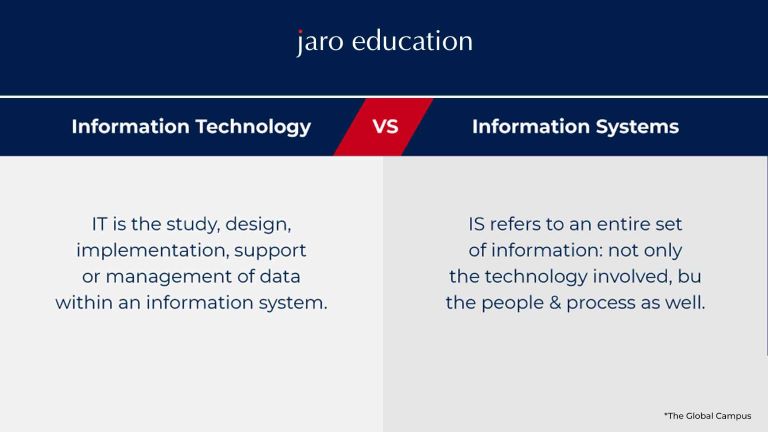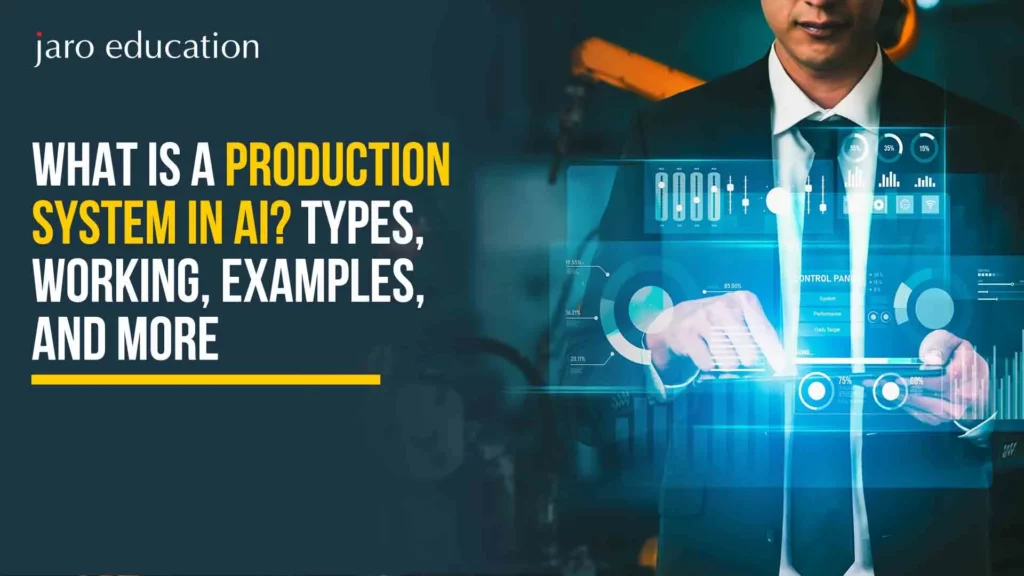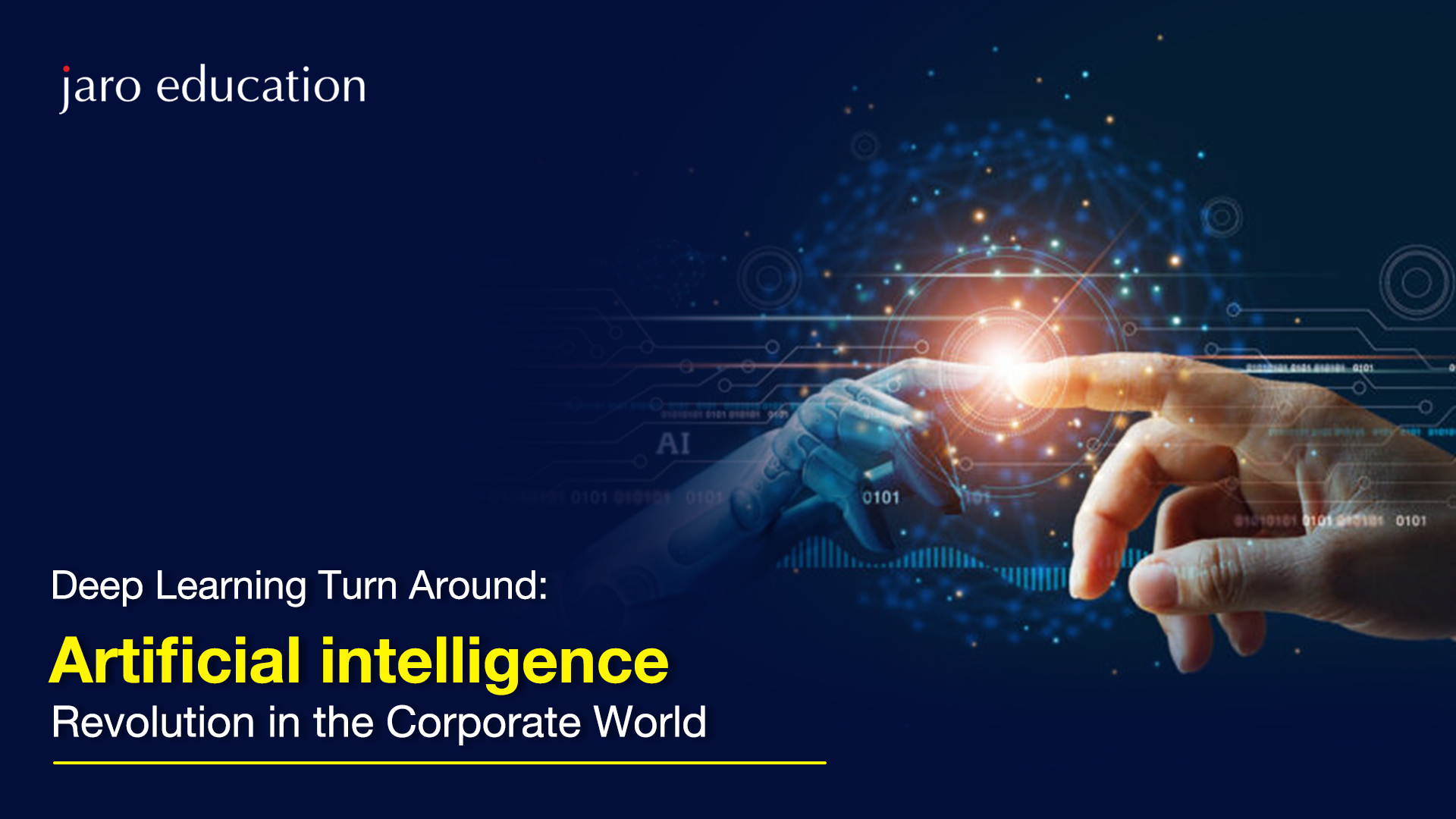Difference between Information System and Information Technology
Table of Contents

- jaro education
- 20, September 2023
- 3:00 pm
In today’s world, data and technology are intertwined with every aspect of our lives. Often emerging in discussions, the terms “Information System” (IS) and “Information Technology” (IT) surround the management and utilisation of information. However, these concepts are often concealed in confusion and ambiguity, despite their prevalence, which leads to confusion about their distinctive roles and exact meanings within organisations and our day-to-day lives. This confusion can unpremeditatedly obscure the foundational distinction that sets these two concepts apart, making it difficult for individuals to fully grasp their understanding and significance.
If you’re interested in learning the fundamentals differences that set these two domains apart, their different scopes, their own set of functions, intricacies and individual contributions to the ever-evolving landscape of modern business practices, you can join the Online Executive MBA Program offered by Dayananda Sagar University, Bengaluru. This program enables you to select from 11 specialisations, provide access to flexible online classes and guidance from Industry Leaders and Subject Experts
What is Information Technology and Information Systems?
Information Technology exhibits the aspects of management and technology infrastructure, which consists of hardware, software, networks and systems. It encompasses technical aspects such as programming, network, administration, cybersecurity and hardware configuration. Providing technical solutions that meet an organisation’s technical requirements, like data security, ensuring reliability, and efficient IT operations, is the primary goal of Information Technology.
Taking a broader approach, Information Systems, on the other hand, is responsible for integrating technology, business processes and people to support decision-making and achieve organisational objectives. The different aspects of IS involves optimising business processes, enhancing data-driven decision-making, aligning technology solutions with strategic goals,and improving the overall efficiency of the organisation.
Contrasting Course Curriculum for Information Technology and Information Systems
Standing at distinct avenues, the educational pathways of each course, Information Technology (IT) and Information Systems (IS), offer a unique blend of knowledge and skills.
The courses are designed to cater for the different interests of individuals, from those inclined towards the technical intricacies of hardware and software to those who seek a holistic approach and understanding of how technology merges with business processes.
Let’s explore the diverse course curriculum and uncover the subjects, methodologies and expertise these distinct programs offer-
Information Technology (IT)
- IT is focused on managing and keeping up with technical infrastructure.
- Areas such as programming, network administration, cybersecurity and hardware configuration are covered.
- Includes subjects like computer programming languages, network protocols, database management and cybersecurity strategies.
- The curriculum focuses on building skill sets that revolve around troubleshooting technical issues, data security, maintaining efficient IT operations and delivering technology solutions.
Information Systems (IS)
- By combining technical and business knowledge, the information system courses serve as a bridge between technology and organisational processes.
- Subjects such as system analysis, database design, business process modelling, project management and organisational behaviour are covered.
- Graduates are trained with skills to analyse business requirements, design information systems, and manage projects combining technology and processes.

*uagc.edu
Career Crossroads: Information Technology vs. Information Systems
While both Information Technology and Information Systems are integral to leveraging the power of technology and data, catering to different aspects of the digital world, they lead individuals to distinct career paths. The career paths being diverse and dynamic, they are designed to serve a distinct set of skills and objectives. Contributing significantly to the digital world, both domains have a critical role in empowering organisations in the technology-driven world.
Here are the different career trajectories within each domain and the specialised roles that IT and IS professionals undertake to drive an organisation’s technological advancement.
Information Technology Career Paths: Technology Specialists
Software Developer/Engineer
These professionals are responsible for designing, coding and testing software applications, creating solutions to fulfil specific business needs and user experiences, and possessing expertise in programming languages and software development methodologies.
Network Engineer
These professionals focus on establishing and maintaining an organisation’s network and are responsible for ensuring network connectivity, monitoring performance and addressing network-related issues. They exhibit in-depth knowledge of network protocols, configuration and troubleshooting.
IT Supporter Specialist
They provide technical assistance and troubleshooting to end-users and internal staff. These professionals resolve hardware, software and connectivity issues, ensuring smooth operations.
Information Systems Career Paths: Business Technology Integrators
Business Analyst
Business analysts are responsible for analysing business processes, identifying opportunities for improvement and translating requirements into technical solutions. These professionals act as a bridge between business stakeholders and IT teams.
IT Consultant
An IT Consultant’s primary role is to provide expert advice to organisations on technology strategies and solutions. These professionals are also responsible for assessing current systems, recommending improvements and assisting in technology adoption.
Project Manager (IT Projects)
Project Managers ensure the planning, execution and successful delivery of IT projects. They are responsible for managing project teams and allocating resources that align with the business goals of an organisation.
Focus and Scope: Information Technology vs. Information Systems
Focusing on the area of technology management, IT and IS encompass distinct scopes. While Information Technology centres on the technical aspects of hardware, software, networks and cybersecurity, it involves tasks such as configuring systems, troubleshooting technical glitches, and ensuring data integrity. Information Systems, on the other hand, adopts a broader perspective of integrating technology with business processes to ensure optimising workflows, streamlining operations and facilitating data-driven decision-making. While IT’s primary focus is to ensure the operational functionality of technological components, IS bridges the gap between technology and business operations.
Leveraging technologies as a means to change the fundamental ways of doing business, focusing on how they can be best harnessed to propel business processes, catalysing innovation and informing decision-making are the prime responsibilities of an IS professional. In contrast, IT revolves around the nuts and bolts of technology infrastructure. However, the collaboration of Information Technology and Information Systems becomes increasingly crucial as organisations continue to navigate the complexities of the digital era. The dynamic interplay between Information Technology and Information System emphasises the complex nature of technology management within organisations.
Skill Sets and Expertise: Information Technology and Information Systems
In the technology-driven business environment, IS and IT professionals possess distinct yet complementary traits, each uniquely tailored according to their domain’s core function.
Information Technology
The skillsets and expertise demanded by Information Technology include technical mastery that spans programming languages, network protocols, system administration and cybersecurity systems. Possessing profound knowledge of hardware and software complexities enables them to smoothly configure, troubleshoot and oversee optimisation technology components, ensuring uninterrupted system operations.
Information Systems
IS professionals bring dynamic, multifaceted skill sets that merge technical aptitude with an acute understanding of business dynamics. They leverage analytical acumen to thoughtfully analyse complex workflows, proficiently design streamlined information systems, and strategically merge technology solutions with the overall objective of the organisation. The skills and expertise possessed by IT and IS professionals align together to help the organisation keep up with the changing world of technologies.
Technical Depth: Information Technology vs. Information Systems
While both Information Technology and Information Systems contribute to the effective functioning of digital environments, their approaches to technology are supported by contrasting levels of technical engagement. Information Technology and Information Systems unveil a complex yet mutual relationship, each domain fostering its own distinct and essential attributes.
Information Technology
Information Technology, being the domain of technical expertise, is inhabited by professionals who navigate the complex landscape of hardware, software and network components with ultimate mastery. These professionals stand as the keepers of digital functionality, skillfully troubleshooting challenges, strengthening cybersecurity bulwarks and enabling the smooth functioning of digital operations.
Information Systems
The Information Systems sphere acts as a bridge-builder, smoothly blending technical acumen with a profound understanding of business processes. This unit of proficient specialists diligently dissects the complex tapestry of operational workflows, organising tailored solutions that expand efficiency, streamline operations and strategically align with the overall organisational flow.
Thus, understanding the distinction of technical depth within these domains sheds light on their contribution to driving innovation, efficiency, and the smooth fusion of technology in diverse organisational contexts.
Wrapping Up
Being integral to the functioning of an organisation, Information Technology forms the backbone of technological infrastructure, while Information Systems represent the strategic integration of technology with business processes. Moreover, cloud computing, artificial intelligence and cybersecurity form the setting against which IS and IT professionals engage, adapting their roles to the shifting dynamics of the digital age. Thus, it is clear that both Information Technology and Information Systems drive businesses toward innovation and success. By embracing their partnership, organisations and individuals can form a resonance, competitive dominance and enduring prosperity.
If you are looking forward to gaining an in-depth knowledge of these concepts, you must definitely consider enrolling yourself in the Online Executive MBA Program at Dayananda Sagar University, Bengaluru. Students will be given the facility of availing the course from remote locations and get access to recorded lectures, offering them the flexibility to watch the lectures at their own convenience and learn at their own pace. The curriculum is designed to be progressive and contemporary, and you will receive mentorship from industry veterans and experts in the respective subjects. For further information on the program, get in touch with Jaro Education.











